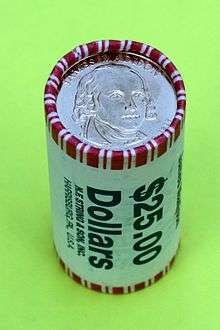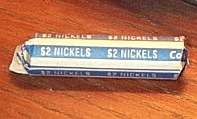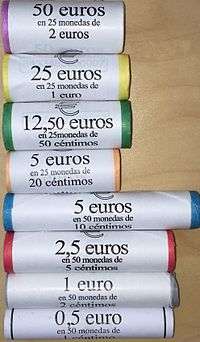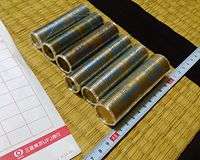Coin wrapper

A coin wrapper, sometimes known as a bank roll or roll is a paper or plastic container for a number of coins.
In the United States, empty rolls are available free at most banks in every denomination (though it is becoming increasingly difficult for half dollar and dollar to be readily made available). The rolls come flat and one side will have to be folded to allow for coins to be placed inside. When the roll is full, the top side will need to be folded. Typically, the full rolls are brought back to the banks in exchange for currency or to be deposited.
In the Eurozone, empty plastic rolls are used at banks in every denomination, with five-coin staggered rows. Their main advantages are:
- Reliability
- Their five-coin staggered rows and transparency make quick verification of contents possible.
- Certainty
- They provide a high degree of certainty (transparency, reliable and legible contents).
- Cost effective
- The high certainty means less time spent processing coins, while the solidity and two-way closure system increase the number of times the coin roll can be used, effectively reducing its overall cost.
In Japan, machine-wrapped coin rolls with plastic container are circulated exclusively, handmade coin rolls are rare. All rolls contains 50 coins. Customers can change bills into coin rolls easily by automatic money changer at Japanese banks.
Searching rolls
Often, coin collectors will ask for full rolls from the bank to search the contents in hopes of finding an interesting piece. Some collectors also save coins of bullion value, such as copper cents and silver half-dollars. This practice is called coin roll hunting. Full rolls are also requested by vendors to make change.
Fraud
Bank rolls are vulnerable to a variety of scams, such as rolling slugs of no value or coins of a lesser value.[1] See also coin rolling scams.
Amount in a roll in the United States

Each denomination has a different amount found in a roll and are color-coded by denomination. See below:
| Color | Name | Denomination | Count | Total Value | Weight (g) | Notes | |
|---|---|---|---|---|---|---|---|
| Red | Cent | 1¢ | 50 | $0.50 | 126 | ||
| Blue | Nickel | 5¢ | 40 | $2.00 | 199 | (in the past, sometimes found in 20 coin, $1.00, half-rolls) | |
| Green | Dime | 10¢ | 50 | $5.00 | 113 | (in the past, sometimes found in 30 coin, $3.00 rolls) | |
| Orange | Quarter | 25¢ | 40 | $10.00 | 226 | (in the past, sometimes found in 20 coin, $5.00, half-rolls) | |
| Tan (sometimes brown or yellow) | Half | 50¢ | 20 | $10.00 | 227 | (sometimes found in 40 coin, $20.00, full-rolls that are closer in size to other denominations rolls) | |
| Grey | Small Dollar | $1.00 | 25 | $25.00 | 203 | ||
| White | Large Dollar | $1.00 | 20 | $20.00 | - | obsolete (in the past, sometimes found in 10 coin, $10.00, half-rolls) | |
| N/A | Quarter Eagle | $2.50 | 40 | $100.00 | - | obsolete | |
| N/A | Half Eagle | $5.00 | 40 | $200.00 | - | obsolete | |
| N/A | Eagle | $10.00 | 50 | $500.00 | - | obsolete | |
| N/A | Double Eagle | $20.00 | 25 | $500.00 | - | obsolete | |
Amount in a roll in the Eurozone

| Color | Denomination | Count | Total Value | |
|---|---|---|---|---|
| White | 1c | 50 | €0.50 | |
| Gray | 2c | 50 | €1.00 | |
| Red | 5c | 50 | €2.50 | |
| Blue | 10c | 40 | €4.00 | |
| Orange | 20c | 40 | €8.00 | |
| Green | 50c | 40 | €20.00 | |
| Yellow | €1 | 25 | €25.00 | |
| Purple | €2 | 25 | €50.00 | |
3 rolls differ in Spain
| Color | Denomination | Count (Spain) | Total Value (Spain) | |
|---|---|---|---|---|
| Blue | 10c | 50 | €5.00 | |
| Orange | 20c | 25 | €5.00 | |
| Green | 50c | 25 | €12.50 | |
Amount in a roll in Japan

Japanese coin rolls are made by plastics, without denomination color-code.
| Color | Denomination | Count | Total Value | Distinguish method | |
|---|---|---|---|---|---|
| N/A | ¥1 | 50 | ¥50 | silver color (aluminum) with smooth edge | |
| ¥5 | 50 | ¥250 | brass color with smooth edge, holed coin | ||
| ¥10 | 50 | ¥500 | bronze color | ||
| ¥50 | 50 | ¥2,500 | silver color (cupronickel) with reeded edge, holed coin | ||
| ¥100 | 50 | ¥5,000 | silver color (cupronickel) with reeded edge | ||
| ¥500 | 50 | ¥25,000 | brass color (nickel-brass) with slantingly reeded edge | ||
Coin bags
In the United Kingdom, coin rolls are not used, instead small plastic bags are provided free of charge at banks which are filled by the customer with the appropriate amount of the same value coin as printed on the bag. When depositing or changing, the bags are weighed at the bank to check they contain the right amount.
See also
References
- ↑ Medenbach, Deborah (July 22, 2009). "Penny Scam Yields Dime Profits in New Paltz". Times Herald-Record. Retrieved 18 July 2012.
| Wikimedia Commons has media related to Bank rolls. |